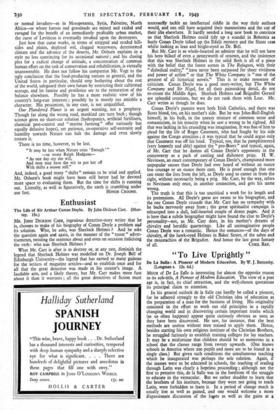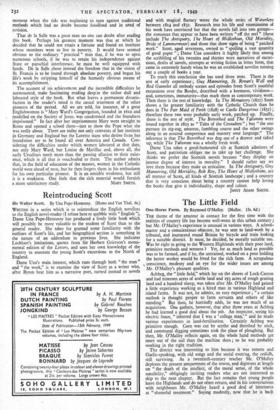" To Live Uprightly "
De La Salle : A Pioneer of Modern Education. By W. J. Battersby. (Longman s. 12s. 6d.) MucH of De La Salle is interesting for almost the opposite reason to its sub-title, A Pioneer of Modern Education. The view of a past age is, in fact, its chief attraction, and the well-chosen quotations its principal claim to attention.
In his general outlook de la Salle can hardly be called a pioneer,
for he adhered strongly to the old Christian idea of education as
the preparation of a man for the business of living. His originality
consisted in the effort to work out old principles in a rapidly
changing world and in discovering certain important truths which (as so often happens) appear quite curiously obvious as soon as they have been discovered. He saw, for instance, that the best methods are useless without men trained to apply them. Hence, besides starting his own religious institute of the Christian Brothers, he struggled furiously to establish training colleges for lay teachers.
It may be a misfortune that children should be so numerous in a school that the classes range from twenty upwards. (One knows schools in America where zoo pupils and more are to be found in a single class.) But given such conditions the simultaneous teaching which he inaugurated was perhaps the sole solution. Again, if the masses were to be educated in schools, the teaching of reading through Latin was clearly a hopeless proceeding ; although not the first to perceive this, de la Salle was in the forefront of the struggle to educate in the vernacular. But we rather shudder to learn that the brothers of his institute, because they were not going to teach Latin, were forbidden to learn it. In a period of change much is usually lost as well as gained, and one would welcome a more dispassionate discussion of the loves as well as the gains at a
moment when the tide was beginning to turn against traditional methods which had no doubt become fossilised and in need of revision.
That de la Salle was a great man no one can doubt after reading this book. Perhaps his greatest moment was that at which he decided that he could not retain a fortune and found an institute whose members, were to live in poverty. It would have seemed obvious to the ordinary " practical " man that, if he was to open numerous schools, if he was to retain his independence against State or parochial interference, he must be well equipped with funds. De la Salle chose instead the freedom that in the vision of St. Francis is to be found through absolute poverty, and began his life's work by stripping himself of the humanly obvious means of its accomplishment.
The account of his achievement and the incredible difficulties he surmounted, make fascinating reading despite the rather dull and laboured style of the book. But what leaves a permanent dissatis- faction in the reader's mind is the casual treatment of the other pioneers of the period. All we are told, for instance, of a great Englishwoman is " Mary Ward's Congregation, founded in 1610 and modelled on the Society of Jesus, was condemned and the foundress imprisoned." In fact after her imprisonment Mary went straight to Rome and opened a school there—just to show the Pope what she was really about. There are today not only convents of her institute in Germany and England but the Loretto nuns who derive from her foundation are to be found all over America and Canada. Con- sidering the difficulties under which women laboured at that date, not only Mary Ward, but Louise de Marillac and, above all, the early Ursulines merit more than the passing allusion to their exist- ence, which is all that .is vouchsafed to them. The author admits that, in the field of education of the masses, women in the Catholic world were ahead of men, but he then forgets them in his enthusiasm for his own particular pioneer. It is an amiable weakness, but still it is a weakness. One feels that the rich material would furnish







































 Previous page
Previous page